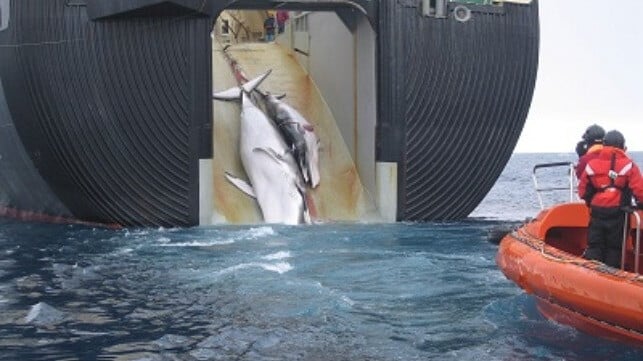IWC Member States Block Plans to Restart Commercial Whaling

In its annual meeting held last week in Peru, the International Whaling Commission has reaffirmed the moratorium on commercial whaling, with a majority of members states rejecting a controversial proposal to end the four-decade-old ban. The efforts to lift the moratorium were led by pro-whaling countries in West and Central Africa, along with the Caribbean nation of Antigua and Barbuda. Instead, a resolution proposed by the European Union to strengthen the global moratorium was adopted.
IWC started implementing the global prohibition on commercial whaling in 1986. The goal was to prevent the extinction of several great whale species, which at the time faced massive threats from rampant illegal and unreported whaling. Scientific reports estimate that 2.9 million whales were killed in commercial whaling operations during the 20th century.
However, even with the moratorium in place, three countries - Japan, Norway and Iceland - continue to conduct commercial whaling. This is possible through a special provision in the International Convention for the Regulation of Whaling (ICRW), which permits whaling for scientific research purposes. For instance, during the 2024 Norwegian whaling season that closed on September 19, 414 whales were captured and killed. Some of the pro-whaling nations have been pushing for the end of the moratorium, citing food security reasons.
But marine scientists and environmental campaign groups have welcomed the IWC’s majority decision to reinforce the whaling moratorium. “The overwhelming majority of governments in the IWC want to end commercial whaling, and we call on whaling nations to respect their international obligations. Iceland’s surprising abstention on the resolution expressing concern about the continuation of commercial whaling is a positive signal: change is afoot,” said Nicolas Entrup, Director of International Relations at the NGO OceanCare.
However, IWC did not pass a resolution to establish a South Atlantic whale sanctuary. This proposal has been considered at almost every IWC meeting since 1999, but has always been blocked by pro-whaling countries. Although 40 countries backed the proposal during last week’s session, it fell short of the required three-quarters majority for adoption. Fourteen nations voted against the proposal with three abstentions.
The proposed South Atlantic whale sanctuary would extend from West Africa to the coasts of Argentina, Uruguay and Brazil. It aims to extend the existing whale sanctuary in the Southern Ocean, which prohibits commercial whaling in the region.
